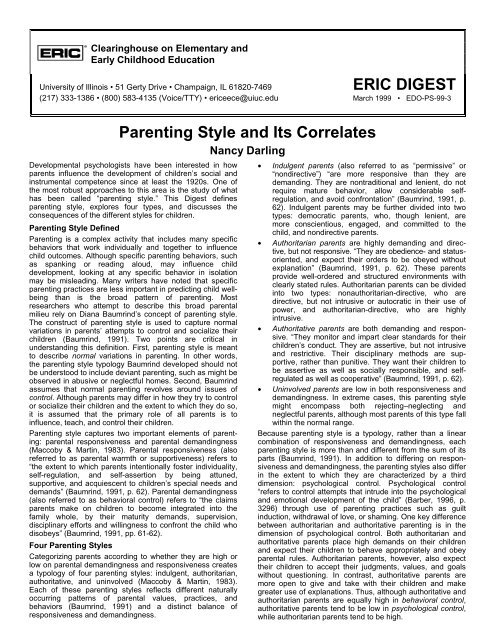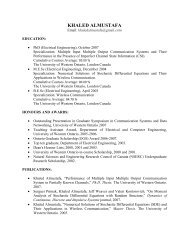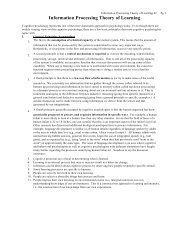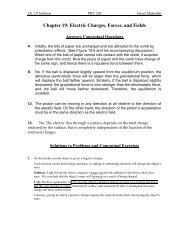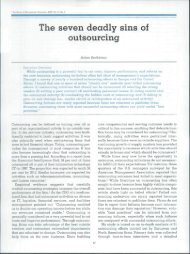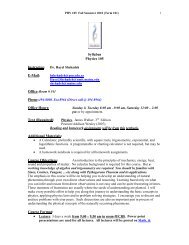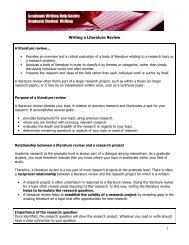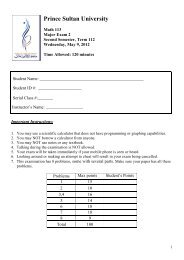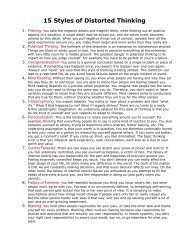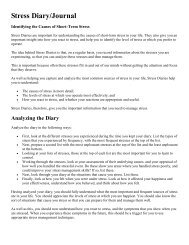Parenting Style and Its Correlates ERIC DIGEST - Early Childhood ...
Parenting Style and Its Correlates ERIC DIGEST - Early Childhood ...
Parenting Style and Its Correlates ERIC DIGEST - Early Childhood ...
Create successful ePaper yourself
Turn your PDF publications into a flip-book with our unique Google optimized e-Paper software.
Clearinghouse on Elementary <strong>and</strong><br />
<strong>Early</strong> <strong>Childhood</strong> Education<br />
<strong>ERIC</strong> <strong>DIGEST</strong><br />
University of Illinois • 51 Gerty Drive • Champaign, IL 61820-7469<br />
(217) 333-1386 • (800) 583-4135 (Voice/TTY) • ericeece@uiuc.edu March 1999 • EDO-PS-99-3<br />
<strong>Parenting</strong> <strong>Style</strong> <strong>and</strong> <strong>Its</strong> <strong>Correlates</strong><br />
Nancy Darling<br />
Developmental psychologists have been interested in how<br />
parents influence the development of children’s social <strong>and</strong><br />
instrumental competence since at least the 1920s. One of<br />
the most robust approaches to this area is the study of what<br />
has been called “parenting style.” This Digest defines<br />
parenting style, explores four types, <strong>and</strong> discusses the<br />
consequences of the different styles for children.<br />
<strong>Parenting</strong> <strong>Style</strong> Defined<br />
<strong>Parenting</strong> is a complex activity that includes many specific<br />
behaviors that work individually <strong>and</strong> together to influence<br />
child outcomes. Although specific parenting behaviors, such<br />
as spanking or reading aloud, may influence child<br />
development, looking at any specific behavior in isolation<br />
may be misleading. Many writers have noted that specific<br />
parenting practices are less important in predicting child wellbeing<br />
than is the broad pattern of parenting. Most<br />
researchers who attempt to describe this broad parental<br />
milieu rely on Diana Baumrind’s concept of parenting style.<br />
The construct of parenting style is used to capture normal<br />
variations in parents’ attempts to control <strong>and</strong> socialize their<br />
children (Baumrind, 1991). Two points are critical in<br />
underst<strong>and</strong>ing this definition. First, parenting style is meant<br />
to describe normal variations in parenting. In other words,<br />
the parenting style typology Baumrind developed should not<br />
be understood to include deviant parenting, such as might be<br />
observed in abusive or neglectful homes. Second, Baumrind<br />
assumes that normal parenting revolves around issues of<br />
control. Although parents may differ in how they try to control<br />
or socialize their children <strong>and</strong> the extent to which they do so,<br />
it is assumed that the primary role of all parents is to<br />
influence, teach, <strong>and</strong> control their children.<br />
<strong>Parenting</strong> style captures two important elements of parenting:<br />
parental responsiveness <strong>and</strong> parental dem<strong>and</strong>ingness<br />
(Maccoby & Martin, 1983). Parental responsiveness (also<br />
referred to as parental warmth or supportiveness) refers to<br />
“the extent to which parents intentionally foster individuality,<br />
self-regulation, <strong>and</strong> self-assertion by being attuned,<br />
supportive, <strong>and</strong> acquiescent to children’s special needs <strong>and</strong><br />
dem<strong>and</strong>s” (Baumrind, 1991, p. 62). Parental dem<strong>and</strong>ingness<br />
(also referred to as behavioral control) refers to “the claims<br />
parents make on children to become integrated into the<br />
family whole, by their maturity dem<strong>and</strong>s, supervision,<br />
disciplinary efforts <strong>and</strong> willingness to confront the child who<br />
disobeys” (Baumrind, 1991, pp. 61-62).<br />
Four <strong>Parenting</strong> <strong>Style</strong>s<br />
Categorizing parents according to whether they are high or<br />
low on parental dem<strong>and</strong>ingness <strong>and</strong> responsiveness creates<br />
a typology of four parenting styles: indulgent, authoritarian,<br />
authoritative, <strong>and</strong> uninvolved (Maccoby & Martin, 1983).<br />
Each of these parenting styles reflects different naturally<br />
occurring patterns of parental values, practices, <strong>and</strong><br />
behaviors (Baumrind, 1991) <strong>and</strong> a distinct balance of<br />
responsiveness <strong>and</strong> dem<strong>and</strong>ingness.<br />
• Indulgent parents (also referred to as “permissive” or<br />
“nondirective”) “are more responsive than they are<br />
dem<strong>and</strong>ing. They are nontraditional <strong>and</strong> lenient, do not<br />
require mature behavior, allow considerable selfregulation,<br />
<strong>and</strong> avoid confrontation” (Baumrind, 1991, p.<br />
62). Indulgent parents may be further divided into two<br />
types: democratic parents, who, though lenient, are<br />
more conscientious, engaged, <strong>and</strong> committed to the<br />
child, <strong>and</strong> nondirective parents.<br />
• Authoritarian parents are highly dem<strong>and</strong>ing <strong>and</strong> directive,<br />
but not responsive. “They are obedience- <strong>and</strong> statusoriented,<br />
<strong>and</strong> expect their orders to be obeyed without<br />
explanation” (Baumrind, 1991, p. 62). These parents<br />
provide well-ordered <strong>and</strong> structured environments with<br />
clearly stated rules. Authoritarian parents can be divided<br />
into two types: nonauthoritarian-directive, who are<br />
directive, but not intrusive or autocratic in their use of<br />
power, <strong>and</strong> authoritarian-directive, who are highly<br />
intrusive.<br />
• Authoritative parents are both dem<strong>and</strong>ing <strong>and</strong> responsive.<br />
“They monitor <strong>and</strong> impart clear st<strong>and</strong>ards for their<br />
children’s conduct. They are assertive, but not intrusive<br />
<strong>and</strong> restrictive. Their disciplinary methods are supportive,<br />
rather than punitive. They want their children to<br />
be assertive as well as socially responsible, <strong>and</strong> selfregulated<br />
as well as cooperative” (Baumrind, 1991, p. 62).<br />
• Uninvolved parents are low in both responsiveness <strong>and</strong><br />
dem<strong>and</strong>ingness. In extreme cases, this parenting style<br />
might encompass both rejecting–neglecting <strong>and</strong><br />
neglectful parents, although most parents of this type fall<br />
within the normal range.<br />
Because parenting style is a typology, rather than a linear<br />
combination of responsiveness <strong>and</strong> dem<strong>and</strong>ingness, each<br />
parenting style is more than <strong>and</strong> different from the sum of its<br />
parts (Baumrind, 1991). In addition to differing on responsiveness<br />
<strong>and</strong> dem<strong>and</strong>ingness, the parenting styles also differ<br />
in the extent to which they are characterized by a third<br />
dimension: psychological control. Psychological control<br />
“refers to control attempts that intrude into the psychological<br />
<strong>and</strong> emotional development of the child” (Barber, 1996, p.<br />
3296) through use of parenting practices such as guilt<br />
induction, withdrawal of love, or shaming. One key difference<br />
between authoritarian <strong>and</strong> authoritative parenting is in the<br />
dimension of psychological control. Both authoritarian <strong>and</strong><br />
authoritative parents place high dem<strong>and</strong>s on their children<br />
<strong>and</strong> expect their children to behave appropriately <strong>and</strong> obey<br />
parental rules. Authoritarian parents, however, also expect<br />
their children to accept their judgments, values, <strong>and</strong> goals<br />
without questioning. In contrast, authoritative parents are<br />
more open to give <strong>and</strong> take with their children <strong>and</strong> make<br />
greater use of explanations. Thus, although authoritative <strong>and</strong><br />
authoritarian parents are equally high in behavioral control,<br />
authoritative parents tend to be low in psychological control,<br />
while authoritarian parents tend to be high.
Consequences for Children<br />
<strong>Parenting</strong> style has been found to predict child well-being in<br />
the domains of social competence, academic performance,<br />
psychosocial development, <strong>and</strong> problem behavior. Research<br />
based on parent interviews, child reports, <strong>and</strong> parent observations<br />
consistently finds:<br />
• Children <strong>and</strong> adolescents whose parents are authoritative<br />
rate themselves <strong>and</strong> are rated by objective<br />
measures as more socially <strong>and</strong> instrumentally competent<br />
than those whose parents are nonauthoritative (Baumrind,<br />
1991; Weiss & Schwarz, 1996; Miller et al., 1993).<br />
• Children <strong>and</strong> adolescents whose parents are uninvolved<br />
perform most poorly in all domains.<br />
In general, parental responsiveness predicts social competence<br />
<strong>and</strong> psychosocial functioning, while parental<br />
dem<strong>and</strong>ingness is associated with instrumental competence<br />
<strong>and</strong> behavioral control (i.e., academic performance <strong>and</strong><br />
deviance). These findings indicate:<br />
• Children <strong>and</strong> adolescents from authoritarian families<br />
(high in dem<strong>and</strong>ingness, but low in responsiveness) tend<br />
to perform moderately well in school <strong>and</strong> be uninvolved<br />
in problem behavior, but they have poorer social skills,<br />
lower self-esteem, <strong>and</strong> higher levels of depression.<br />
• Children <strong>and</strong> adolescents from indulgent homes (high in<br />
responsiveness, low in dem<strong>and</strong>ingness) are more likely<br />
to be involved in problem behavior <strong>and</strong> perform less well<br />
in school, but they have higher self-esteem, better social<br />
skills, <strong>and</strong> lower levels of depression.<br />
In reviewing the literature on parenting style, one is struck by<br />
the consistency with which authoritative upbringing is<br />
associated with both instrumental <strong>and</strong> social competence<br />
<strong>and</strong> lower levels of problem behavior in both boys <strong>and</strong> girls<br />
at all developmental stages. The benefits of authoritative<br />
parenting <strong>and</strong> the detrimental effects of uninvolved parenting<br />
are evident as early as the preschool years <strong>and</strong> continue<br />
throughout adolescence <strong>and</strong> into early adulthood. Although<br />
specific differences can be found in the competence<br />
evidenced by each group, the largest differences are found<br />
between children whose parents are unengaged <strong>and</strong> their<br />
peers with more involved parents. Differences between<br />
children from authoritative homes <strong>and</strong> their peers are equally<br />
consistent, but somewhat smaller (Weiss & Schwarz, 1996).<br />
Just as authoritative parents appear to be able to balance<br />
their conformity dem<strong>and</strong>s with their respect for their<br />
children’s individuality, so children from authoritative homes<br />
appear to be able to balance the claims of external<br />
conformity <strong>and</strong> achievement dem<strong>and</strong>s with their need for<br />
individuation <strong>and</strong> autonomy.<br />
Influence of Sex, Ethnicity, or Family Type<br />
It is important to distinguish between differences in the<br />
distribution <strong>and</strong> the correlates of parenting style in different<br />
subpopulations. Although in the United States authoritative<br />
parenting is most common among intact, middle-class<br />
families of European descent, the relationship between<br />
authoritativeness <strong>and</strong> child outcomes is quite similar across<br />
groups. There are some exceptions to this general statement,<br />
however: (1) dem<strong>and</strong>ingness appears to be less critical to<br />
girls’ than to boys’ well-being (Weiss & Schwarz, 1996), <strong>and</strong><br />
(2) authoritative parenting predicts good psychosocial<br />
outcomes <strong>and</strong> fewer problem behaviors for adolescents in all<br />
ethnic groups studied (African-, Asian-, European-, <strong>and</strong><br />
Hispanic Americans), but it is associated with academic performance<br />
only among European Americans <strong>and</strong>, to a lesser<br />
extent, Hispanic Americans (Steinberg, Dornbusch, & Brown,<br />
1992; Steinberg, Darling, & Fletcher, 1995). Chao (1994) <strong>and</strong><br />
others (Darling & Steinberg, 1993) have argued that<br />
observed ethnic differences in the association of parenting<br />
style with child outcomes may be due to differences in social<br />
context, parenting practices, or the cultural meaning of<br />
specific dimensions of parenting style.<br />
Conclusion<br />
<strong>Parenting</strong> style provides a robust indicator of parenting<br />
functioning that predicts child well-being across a wide<br />
spectrum of environments <strong>and</strong> across diverse communities<br />
of children. Both parental responsiveness <strong>and</strong> parental<br />
dem<strong>and</strong>ingness are important components of good<br />
parenting. Authoritative parenting, which balances clear, high<br />
parental dem<strong>and</strong>s with emotional responsiveness <strong>and</strong><br />
recognition of child autonomy, is one of the most consistent<br />
family predictors of competence from early childhood through<br />
adolescence. However, despite the long <strong>and</strong> robust tradition<br />
of research into parenting style, a number of issues remain<br />
outst<strong>and</strong>ing. Foremost among these are issues of definition,<br />
developmental change in the manifestation <strong>and</strong> correlates of<br />
parenting styles, <strong>and</strong> the processes underlying the benefits<br />
of authoritative parenting (see Schwarz et al., 1985; Darling<br />
& Steinberg, 1993; Baumrind, 1991; <strong>and</strong> Barber, 1996).<br />
For More Information<br />
Barber, B. K. (1996). Parental psychological control: Revisiting<br />
a neglected construct. Child Development, 67(6), 3296-3319.<br />
EJ 545 015.<br />
Baumrind, D. (1989). Rearing competent children. In W. Damon<br />
(Ed.), Child development today <strong>and</strong> tomorrow (pp. 349-378).<br />
San Francisco: Jossey-Bass.<br />
Baumrind, D. (1991). The influence of parenting style on<br />
adolescent competence <strong>and</strong> substance use. Journal of <strong>Early</strong><br />
Adolescence, 11(1), 56-95.<br />
Chao, R. K. (1994). Beyond parental control <strong>and</strong> authoritarian<br />
parenting style: Underst<strong>and</strong>ing Chinese parenting through the<br />
cultural notion of training. Child Development, 65(4), 1111-1119.<br />
EJ 491 656.<br />
Darling, N., & Steinberg, L. (1993). <strong>Parenting</strong> style as context:<br />
An integrative model. Psychological Bulletin, 113(3), 487-496.<br />
Maccoby, E. E., & Martin, J. A. (1983). Socialization in the<br />
context of the family: Parent–child interaction. In P. H. Mussen<br />
(Ed.) & E. M. Hetherington (Vol. Ed.), H<strong>and</strong>book of child<br />
psychology: Vol. 4. Socialization, personality, <strong>and</strong> social<br />
development (4th ed., pp. 1-101). New York: Wiley.<br />
Miller, N. B., Cowan, P. A., Cowan, C. P., & Hetherington, E. M.<br />
(1993). Externalizing in preschoolers <strong>and</strong> early adolescents: A<br />
cross-study replication of a family model. Developmental<br />
Psychology, 29(1), 3-18. EJ 461 700.<br />
Schwarz, J. C., Barton-Henry, M. L., & Pruzinsky, T. (1985).<br />
Assessing child-rearing behaviors: A comparison of ratings<br />
made by mother, father, child, <strong>and</strong> sibling on the CRPBI. Child<br />
Development, 56(2), 462-479. EJ 315 787.<br />
Steinberg, L., Darling, N., & Fletcher, A. C. (1995). Authoritative<br />
parenting <strong>and</strong> adolescent adjustment: An ecological journey. In<br />
P. Moen, G. H. Elder, Jr., & K. Luscher (Eds.), Examining lives<br />
in context: Perspectives on the ecology of human development<br />
(pp. 423-466). Washington, DC: American Psychological Assn.<br />
Steinberg, L., Dornbusch, S. M., & Brown, B. B. (1992). Ethnic<br />
differences in adolescent achievement: An ecological<br />
perspective. American Psychologist, 47(6), 723-729.<br />
Weiss, L. H., & Schwarz, J. C. (1996). The relationship between<br />
parenting types <strong>and</strong> older adolescents’ personality, academic<br />
achievement, adjustment, <strong>and</strong> substance use. Child<br />
Development, 67(5), 2101-2114. EJ 539 840.<br />
____________________<br />
References identified with an ED (<strong>ERIC</strong> document), EJ (<strong>ERIC</strong> journal), or PS<br />
number are cited in the <strong>ERIC</strong> database. Most documents are available in <strong>ERIC</strong><br />
microfiche collections at more than 1,000 locations worldwide <strong>and</strong> can be<br />
ordered through EDRS: (800) 443-<strong>ERIC</strong>. Journal articles are available from<br />
the original journal, interlibrary loan services, or article reproduction<br />
clearinghouses such as UnCover (800) 787-7979 or ISI (800) 523-1850.<br />
<strong>ERIC</strong> Digests are in the public domain <strong>and</strong> may be freely reproduced.<br />
This project has been funded at least in part with Federal funds from the<br />
U.S. Department of Education, Office of Educational Research <strong>and</strong><br />
Improvement, under contract number ED-99-CO-0020. The content of this<br />
publication does not necessarily reflect the views or policies of the U.S.<br />
Department of Education, nor does mention of trade names, commercial<br />
products, or organizations imply endorsement by the U.S. Government.


